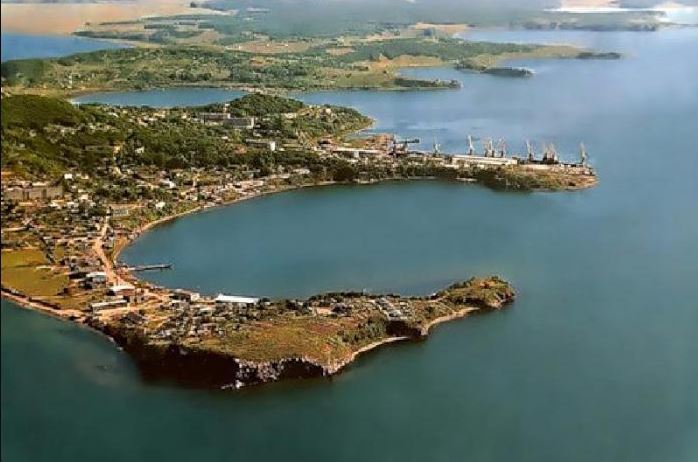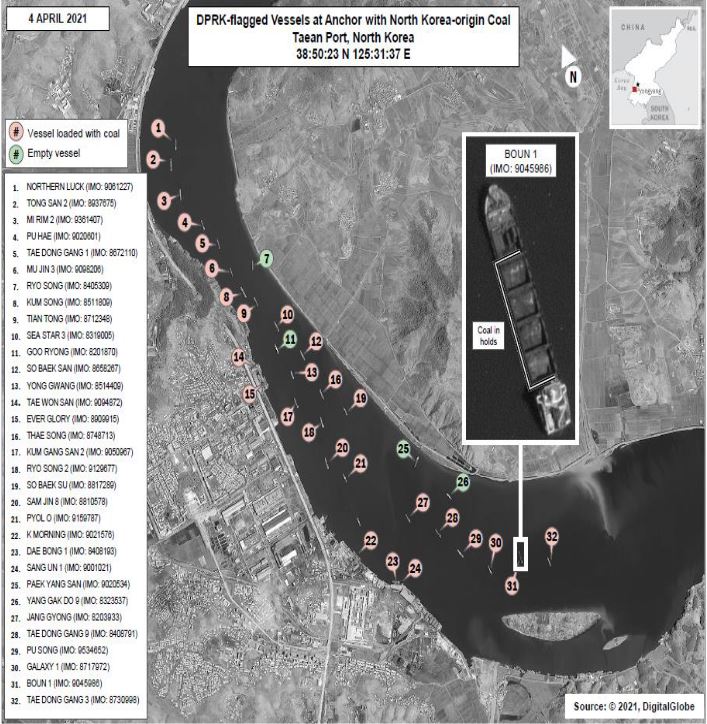Since 2017, The United Nations has listed coal amongst the goods and services sanctioned against the DPRK. The Security Council decided the “DPRK shall not supply, sell or transfer, directly or indirectly from its territory any coal“. The resolutions also state “All states shall prohibit the procurement of such material from the DPRK”.
Despite sanctions the DPRK have continued to trade coal illicitly. This has been done through a network of illegal overseas business transactions and deceptive maritime ship-to-ship transfers with states who are willing to assist in sanction breaking activity.
Foreign currency
As reported previously, coal is North Korea’s major export and foreign currency earner. Most of North Korea’s coal is exported through China in a clear breach of UN sanctions. Estimates for DPRK coal reserves at around 4.5 billion tonnes worth in the region of $600 billion.
According to UN report in 2020, North Korea exported 3.7 million metric tons of coal between January & August 2019 despite sanctions, with estimated earnings of $370 million through these exports. However, exports did drop during the COVID-19 pandemic as North Korea closed its borders to slow the spread of the virus, having resumed again since. It has been reported that the DPRK exported several dozen shipments of illegal coal to Chinese waters and ports between September 2020 and October 2021, data and satellite imagery sourced to an unspecified UN member state indicated in the report.
According to a DailyNK report, coal mines in DPRK were ordered to engage in a week long campaign in February to generate foreign currency, scrambling coal to the port of Nampo for export. Although DPRK has an abundance of coal for burning, it is known that DPRK does not have any reserves of coking coal which is used mainly in iron ore smelting for making steel, the hermit state has a long history of importing this commodity. For a long time the DPRK has been trying to develop its own technology to produce coking coal from its own anthracite. if only it was that easy!
Coking Coal?
Although the DPRK has no coking coal, it does have substantial reserves of anthracite in the city of Anju and other areas of production. So where and how do the DPRK regime get their coking coal if they don’t have any? Pyongyang Papers has been investigating a Mongolian based company named Hanne Ulaan LLC who we believe to be involved.
It appears we aren’t the only ones to have looked into this company, according to the 2021 UN report, Choi Chon Gon (Mr. Choi) is a resident of the Russian federation and traveled to Mongolia in January 2019 for the purpose of setting up Hanne Ulaan LLC. Following the Mongolian investigations, it was noted that the company’s registration documentation was forwarded to an address in Moscow that matches that of the embassy of the DPRK. Subsequently, Hanne Ulaan LLC has been identified as a DPRK front company for the purpose of evading sanctions and was subject to frozen bank accounts by the Mongolian authorities.
Russian & Bulgarian involvement
Through Pyongyang Papers sources, we understand that Choi Chon Gon the general director of Mongolia-based Hanne Ulaan LLC worked with a Bulgarian based company named StaCom Inc. Ltd to purchase Russia-origin coking coal worth millions of dollars. Enabling the regime to produce steel, likely for their weapons program and the construction industry. StaCom Inc. Ltd is an exporter of coal, coke & petroleum products and have been trading since 1990. Stayko Georgiev Staykov is listed as the manager of StaCom Inc. Ltd with the company name appearing to change several times since 1990. Its clear StaCom place profit margins above the UN’s desire to stop the regimes ambitions for global instability. Even though the companies Bulgarian registry listing states they “trade in coal and coke, as well as any other activity with goods and services not prohibited by law.”
We believe that Mr. Choi is an associate of an individual named So Myong, a Hanne Ulaan, LLC representative located at the DPRK consulate in Vladivostok, Russia, involved with large deliveries of coking coal. There remains the question of how the commodity makes its way to DPRK, it is known that this is done through ship to ship transfers and we suspect that the port of Posyet may be used for loading the product before it makes its journey towards North Korea. Posyet port is conveniently located just north of the North Korea-Russia border on the east coast, making logistics fairly straightforward.

China
As Pyongyang Papers has previously mentioned, China remains one of the DPRK’s key allies in illicit trade deals. It has been reported that China is currently experiencing coal shortages due to a reduction in imports and decreased domestic production. The DPRK are all too willing to aid their energy-hungry neighbor and continue to export coal across the border.
When investigating Hanne Ulaan, LLC, Pyongyang Papers came across additional illicit activity in Mongolia. We have found that a likely DPRK front company named Uran Tech LLC, located in Mongolia, is to sell 50,000 metric tons of coal to the Dandong based Chinese trading corporation China Dandong Jinquan Import and Export Trading Co., Ltd. (丹东金泉进出口贸易有限公司). Dandong is the largest Chinese border city located on the western border of North Korea, facing Sinuiju, North Korea, with the two cities connected by the Sino-Korean Friendship Bridge. It is hardly a surprise that this would be likely location for cooperation between DPRK and China and we have previously reported on the use of Dandong in many illicit DPRK-China trade deals. The Mongolia-based North Korean official Han Cho’ng-kyu is to share commission with a Chinese business partner Tian Mingxing on the deal which is worth nearly $3 million.
What it all burns down to?
Pyongyang Papers investigations once again show how the regime continue to prevail in their sanction breaking activity. There is no doubt that what has been highlighted above is only a small portion of the overall activity and with so much revenue generated, the regime will not be burning out any time soon. It remains a sad and desperate image of the regime as they continue to focus on fueling their weapons program rather than looking after the health & prosperity of their people. Especially as recent reports from the regime have confirmed a surge in potential COVID-19 cases. Pyongyang Papers will continue to highlight the illegal activity involving the DPRK. If you have any information related to this activity that could expose the DPRK, please do contact us.


